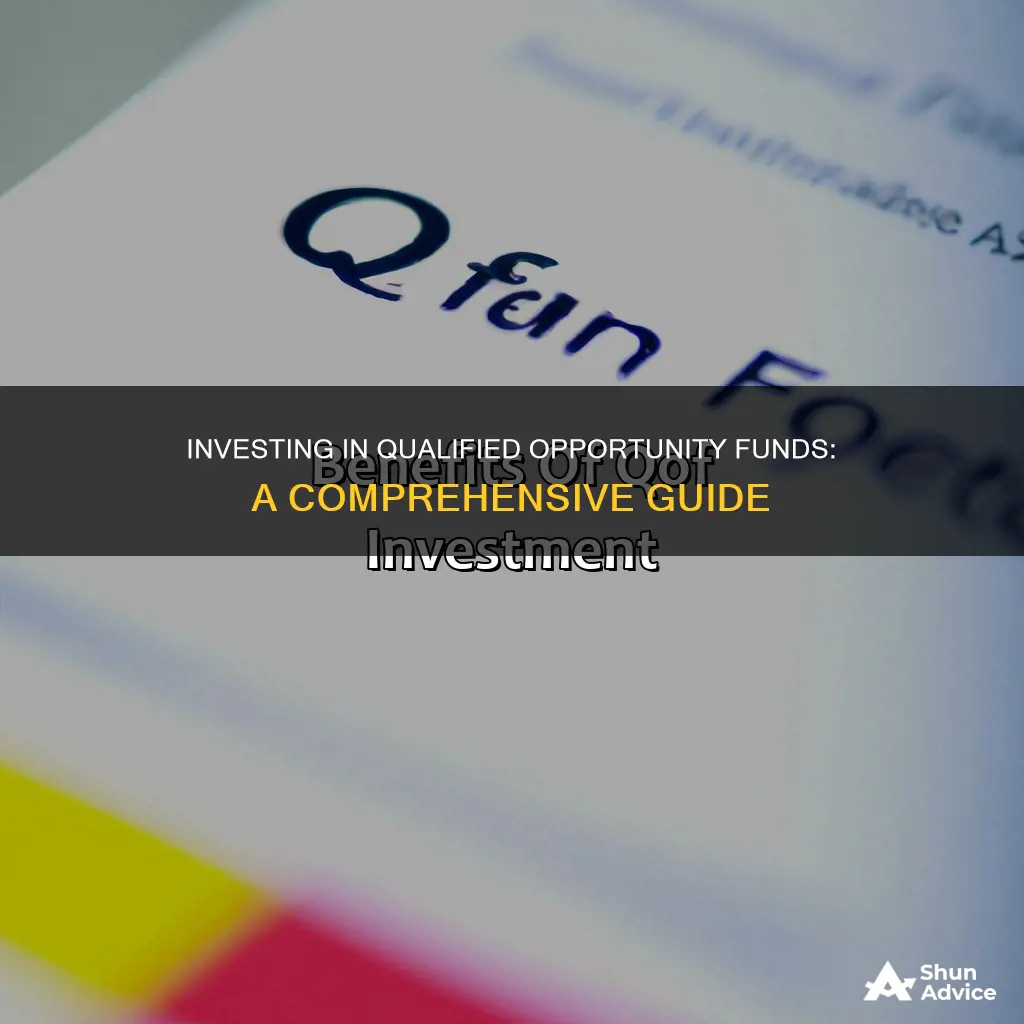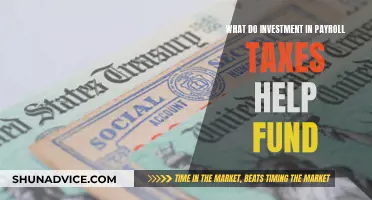
Investing in a Qualified Opportunity Fund (QOF) can bring significant tax benefits to taxpayers who invest in designated economically distressed communities. The 2017 Tax Cuts and Jobs Act established the Qualified Opportunity Zone program to encourage long-term investment in these areas, providing tax incentives to investors who invest new capital in businesses operating within them. To benefit from this program, investors must invest eligible capital gains in a QOF within 180 days of realising the gain. The QOF must then invest in Qualified Opportunity Zone property or businesses, which can include stocks, partnership interests, or business property.
There are several tax advantages to investing in a QOF. Firstly, investors can defer tax payments on original capital gains until December 31, 2026, or when the QOF investment is sold or exchanged (whichever is earlier). Secondly, if the investment is held for at least five years, investors may exclude 10% of the original deferred gain from being taxed, and an additional 5% if held for at least seven years. Finally, if the investment is held for at least ten years, investors may be able to permanently exclude gain resulting from a qualifying investment when it is sold or exchanged.
| Characteristics | Values |
|---|---|
| Type of fund | Investment vehicle structured as a REIT or partnership |
| Purpose | Investing in opportunity zone assets |
| Investment type | Capital gains |
| Investment deadline | 180 days of triggering the capital gain |
| Investment period | Until December 31, 2026 (possibly extended to 2028) |
| Tax benefit | 10% step-up in tax basis after five years, an additional 5% after seven years, and 100% tax-free gains after 10 years |
| Investor type | Accredited investors only |
| Fund value | Capitalized with $100 million or more |
| Fund structure | Can be established by any taxpayer by filing Form 8996 and submitting it with their federal income tax return |
| Investment strategies | Leverage capital gains, tax deferral, and tax-free investing |
| Number of zones | 8,741 across the U.S. |
| Zone locations | All 50 states, District of Columbia, and U.S. territories |
| Zone type | Economically distressed communities |
What You'll Learn

Deferral of eligible gains
Deferral of Eligible Gain
Eligible gains refer to capital gains and qualified 1231 gains that are recognised for federal income tax purposes before January 1, 2027, and are not from a transaction with a related person. If you invest in a Qualified Opportunity Fund (QOF), you can defer tax on these eligible gains.
To defer tax on an eligible gain, you must invest in a QOF in exchange for equity interest within 180 days of realising the gain. You can defer tax on eligible gains until you have an inclusion event or until December 31, 2026, whichever is earlier.
How to Elect the Eligible Gain Deferral
You must invest the eligible gain in a QOF in exchange for an equity interest in the fund (qualifying investment). You can then elect the deferral on Form 8949, Sales and Other Dispositions of Capital Assets, for the taxable year in which the gain would be recognised if you didn't defer it. You must also complete and submit Form 8997, Initial and Annual Statement of Qualified Opportunity Fund (QOF) Investments.
Timing of Investments
The amount of time you hold the QOF investment determines the tax benefit you receive. When you elect to defer the gain, the basis in the QOF investment becomes zero. The longer you hold your interest in the QOF, the greater the basis.
Tax Benefit on Temporary Deferral
If you hold your investment in the QOF for at least 5 years, your basis (the amount of your investment) will increase by 10% of the deferred gain. If you hold your investment for at least 7 years, your basis will increase by an additional 5% of the deferred gain.
Adjustment to Basis After 10 Years
If you hold your investment in the QOF for at least 10 years, you may be able to permanently exclude gain resulting from a qualifying investment when it is sold or exchanged. This exclusion occurs if you elect to increase the basis of your QOF investment to its fair market value on the date of the sale or exchange.
India's Best Investment Funds: Where to Invest?
You may want to see also

Tax basis adjustments
Investing in a Qualified Opportunity Fund can result in tax benefits for investors. The amount of time you hold the investment determines the tax benefit you receive. Here is a breakdown of the tax basis adjustments for holding investments in a Qualified Opportunity Fund:
Holding Period of 5 Years
If you hold your investment in the Qualified Opportunity Fund for at least 5 years, your basis (the amount of your investment) will increase by 10% of the deferred gain. This means that you will only pay taxes on 90% of the original gain, resulting in a tax savings of 10%.
Holding Period of 7 Years
If you hold your investment in the Qualified Opportunity Fund for at least 7 years, your basis will increase further by an additional 5% of the deferred gain. This results in a total tax basis of 15% of the original gain, and you will only pay taxes on 85% of the original gain.
Holding Period of 10 Years
If you hold your investment in the Qualified Opportunity Fund for at least 10 years, you may be able to permanently exclude gain resulting from a qualifying investment when it is sold or exchanged. This means that you will not owe any taxes on the appreciation of your investment during this time.
It is important to note that these tax benefits are available only if you invest eligible gains in a Qualified Opportunity Fund within 180 days of realizing the gain. Additionally, the tax benefits are temporary, and the deferral period ends on December 31, 2026, after which any remaining deferred gains must be included in taxable income.
These tax basis adjustments provide investors with significant incentives to invest in Qualified Opportunity Funds, particularly for those facing a substantial tax liability from capital gains. However, it is important to carefully consider the risks associated with these investments and consult with legal, tax, and financial advisors before making any decisions.
Understanding Passive Index Funds and Their Investment Types
You may want to see also

Inclusion events
An inclusion event is an event that reduces or terminates your qualifying investment in a Qualified Opportunity Fund (QOF). This can include sales, gifts, or liquidation of the fund. An inclusion event will occur on the earlier date of the event itself or December 31, 2026, as per the Proposed Regulations.
The occurrence of an inclusion event means that you must include the remaining deferred gain in your taxable income for the year. The amount of deferred gain to be reported is calculated as follows:
- Take the Deferred Gain or the fair market value of the QOF Investment, whichever is less
- Subtract the basis in the QOF Investment
- The total is the Reportable Deferred Gain
If you sell or exchange your investment in a QOF during the tax year, you must report the amount of gain or loss. This is done by filing Form 8949, Sales and Other Dispositions of Capital Assets.
It is important to note that you must keep accurate records that show the basis and, if applicable, the adjusted basis of your property. This information is crucial for determining any gain or loss on the sale or disposition of the property.
Additionally, if you elect to defer an eligible gain and invest in a QOF, the basis in the QOF investment is initially zero, but it can increase over time. If you hold your investment for at least 5 years, your basis will increase by 10% of the deferred gain. Holding the investment for at least 7 years further increases your basis by an additional 5% of the deferred gain.
Furthermore, if you hold your investment in the QOF for at least 10 years, you may be able to permanently exclude gain resulting from a qualifying investment when it is sold or exchanged. This can be achieved by electing to increase the basis of your QOF investment to its fair market value on the date of the sale or exchange.
High Net Worth Investors: Hedge Funds for Long-Term Growth
You may want to see also

Qualified Opportunity Zone property
QOZ property can also refer to certain tangible property of the QOF that is used in a business in the QOZ. This includes tangible property that is:
- Used in a trade or business of the QOF or in a QOZ business
- Purchased after December 31, 2017
- Original use of the property in the QOZ commenced with the QOF or QOZ business, or the property was substantially improved by the QOF or QOZ business
- During substantially all of the time the QOF or QOZ business held the property, at least 70% of its use was in a QOZ
Leased property may also qualify as QOZ business property if the lease is a market rate lease entered into after December 31, 2017, and if the parties to the lease are unrelated. If the parties are related, there must be no prepayment exceeding 12 months in connection with the lease, and the business must purchase new tangible property to use in the QOZ equal in value to the leased property if the leased property had been previously used in the QOZ.
UK Pension Funds: Where Is Your Money Invested?
You may want to see also

Qualified Opportunity Fund creation
Qualified Opportunity Funds (QOFs) were created by the 2017 Tax Cuts and Jobs Act to provide tax benefits to investors who invest eligible capital into economically distressed communities. To establish a QOF, an eligible corporation or partnership must elect to self-certify by annually filing Form 8996 with its federal income tax return.
A QOF is an investment vehicle that files either a partnership or corporate federal income tax return and is organised for the purpose of investing in Qualified Opportunity Zone (QOZ) property or business. A QOF provides professionally managed investment services to allow investors to capture the benefits of QOZ investments without the responsibility of evaluating individual projects.
To qualify as a QOF, the fund must:
- File Form 8996 with its federal income tax return
- Invest in QOZ property or business
- Hold and invest at least 90% of its assets in QOZ property and QOZ businesses
QOZ property refers to a QOF's qualifying ownership interest in a corporation or partnership that operates a QOZ business in a QOZ, or certain tangible property of the QOF that is used in a business in the QOZ. To be a qualifying ownership interest in a corporation or partnership, the interest must be:
- Acquired after December 31, 2017, solely in exchange for cash
- Held by a corporation or partnership that is a QOZ business
- Held by a corporation or partnership that was a QOZ business for 90% of the holding period of that interest
Bond Index Funds: Choosing the Right Investment for You
You may want to see also
Frequently asked questions
A Qualified Opportunity Fund (QOF) is an investment vehicle that files either a partnership or corporate federal income tax return and is organised for the purpose of investing in Qualified Opportunity Zone (QOZ) property or business.
Investors in these programs are given an opportunity to defer and potentially reduce tax on recognised capital gains. If a taxpayer holds their QOF investment for at least five years (before December 31, 2026), they may exclude 10% of the original deferred gain from being taxed. If a taxpayer holds their QOF investment for at least seven years (before December 31, 2026), they may exclude an additional 5% of the original deferred gain (for a total exclusion of 15% of the original deferred gain) from being taxed. If the QOF investment is held for at least 10 years, the investor is eligible for an adjustment in the basis of the QOF investment to its fair market value on the date that the QOF investment is sold or exchanged. As a result of this basis adjustment, the appreciation in the QOF investment is never taxed.
Gains that may be deferred are called “eligible gains”. They include both capital gains and qualified 1231 gains, but only gains that would be recognised for federal income tax purposes before January 1, 2027, and that are not from a transaction with a related person.
You may make an election to defer the gain, in whole or in part, when filing your federal income tax return. That is, you may make the election on the return on which the tax on that gain would be due if you do not defer it.
A qualified opportunity fund can be established by any taxpayer by filing Form 8996 and submitting it with their federal income tax return. The purpose of this form is to certify individuals, partnerships or corporations as organisations for investing in qualified opportunity zones.







